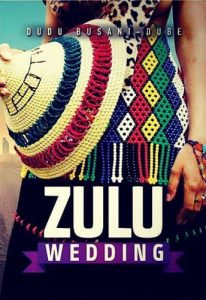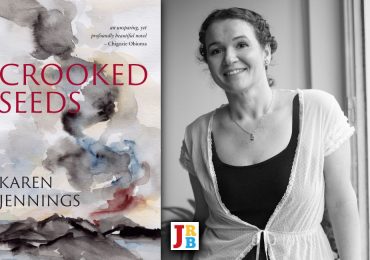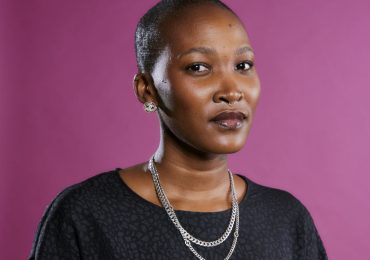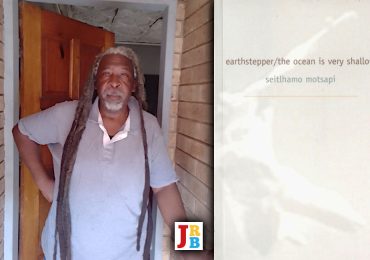Dudu Busani-Dube, author of the wildly popular Hlomu series, chats to The JRB Editor Jennifer Malec.
 Zulu Wedding
Zulu Wedding
Dudu Busani-Dube
Hlomu Publishing, 2018
Dudu Busani-Dube is a publishing phenomenon. Her Hlomu series, comprising Hlomu the Wife, Zandile the Resolute and Naledi His Love, has sold tens of thousands of copies, and her new book, the standalone title Zulu Wedding, which was released last week, has been selling out as soon as it touches the shelves. It rocketed to the number one spot at Exclusive Books within days of its release earlier this month.
Busani-Dube started writing Hlomu the Wife in 2015, and shared excerpts with friends, asking them for help in editing the book. Instead of helping her, they were instantly hooked, and begged her to continue the story. She decided to self-publish, and after a few false starts, she began selling books from the boot of her car. Now, Busani-Dube is one of the few self-published authors to claim bestseller status in South Africa. Fans eagerly await the fourth and final book in the Hlomu series.
Busani-Dube chatted to The JRB about her extraordinary publishing journey, her maverick approach to storytelling, her new book, and her plans for the Hlomu series.
Jennifer Malec for The JRB: You’ve mentioned that you first realised you had a talent for storytelling when one of your stories made you famous in high school. What was that story about?
Dudu Busani-Dube: I wasn’t given a specific topic. Just a ‘write a story in the first person’ brief, and up to today I still maintain she asked me because she thought I wasn’t going to do it. I was not known for doing homework and, also, I was the only one given the assignment in my class. I ended up writing about being a gangster who robbed people at night under a specific streetlight. I didn’t even know it was good until she made a big fuss about it and read it in every class.
The JRB: Why did you decide to self-publish your books? Was it that you couldn’t get a publisher willing to take your work on, or was it that you found trade publishers were not a good fit for what you wanted to achieve?
Dudu Busani-Dube: I only started speaking with publishers after my books were already doing well. I can’t say I was rejected by the industry, but I still believe that if I had tried, I would have been rejected. I thought a lot about approaching a few publishers when I was sitting with a complete Hlomu The Wife for two months, but something kept telling me they weren’t going to understand, because I have total disregard for the rules of literature as they are, and what is perceived as a good book or good literature. I believe that honesty in creativity and telling stories the way you want are important.
The JRB: A few years on, do you think this is still the case? Would you consider working with a publisher for your future books?
Dudu Busani-Dube: I probably will because I’m not passionate about publishing. I hate the massive amount of work that comes with it—and most of all the demon called distribution. This is why I choose to publish only my work under Hlomu Publishing. I don’t see myself managing a publishing house and actually taking on other people’s work.
The JRB: I read that you are thinking about developing your publishing business and expanding into publishing other people’s stories?
Dudu Busani-Dube: [laughs] Nope, I could never be a full-time publisher, that thing is too much work. My fun ends when I finish writing, after that everything is hard labour.
The JRB: What kind of challenges did you face in producing your own books: cover design, printing, distribution of copies to booksellers, and so on?
Dudu Busani-Dube: First of all, I had no money. I was just living off my salary, which fortunately wasn’t that bad. The cover of my first book was modelled by my two colleagues. The picture was taken at my office parking lot by another colleague who is a photographer. It helped that my friend’s husband is a graphic designer, so he did my cover. I’m not sure if there was a discount but at least it was around payday so I was able to pay him! I made some money from selling the PDF of Hlomu on my blog and that was how I was able to print.
But also, I knew nothing about publishing, so I would go to my bookshelf, line a few books on the table and check the copyright pages to see what needed to be there, what font and font sizes they used, and all of that. I actually had to Google what an ISBN number was and why it is important.
My first print run was a disaster, the font was so small I couldn’t even read the book myself. I hated the paper that we used and I just hated everything—but I knew there was no way of getting back the money I had spent so I moved on.
I found new printers, I researched paper types and book sizes before I printed again. Then came the trying-to-sell-the-books part.
The JRB: In South Africa, and internationally, more and more people are beginning to self-publish their work. But it then becomes a challenge to gain access to the books value chain, specifically into major bookstores. How did you manage to achieve that?
Dudu Busani-Dube: By that time I had written Zandile The Resolute and it was already popular because I had blogged the first few chapters. I tried bookshops but they were not interested because most of them don’t sell self-published books, so I just started selling my books myself, from the boot of my car and through friends and strangers and pop-up sales. Online bookstores such as My African Buy were the first to take my books. They were popular and they were selling like crazy, but mainstream bookstores were just not hearing it.
Adams Books and Bridge Books were among the first physical stores to stock my books. The others only started calling a year later. I could have been bitter about it, but for me the most important thing is for my readers to have access to my books and the shops make that easy.
Ultimately I sold and marketed my books myself until they noticed. I always advise self-published writers to do that. Also, it’s important for your book to look professional.
The JRB: Books are often turned into a films, but with your most recent book, Zulu Wedding, the process was reversed. Did you face any challenges writing a book inspired by a film? What did you decide to leave out, or add? I hear you added the scene set in Lesotho, which was one of my favourite parts of the book.
Dudu Busani-Dube: I did and it’s been amazing. I think the fact that we were doing something that isn’t usually done added to the excitement. When I met Lineo [Sekeleoane], the creator and producer of the movie, at first I wasn’t sure what she was trying to make me do, but I loved that she had a colourful mind and is always thinking up ideas. After speaking a few times eventually she got me to watch the movie, uncut, and I loved it. I love the story and I love that the cast is great and that’s it’s actually funny!
So I decided I was going to be a part of it. But it took me a while to start writing because I was almost done with my fourth book in the Hlomu series, so I kept putting it aside until she asked me how far I was. I was nowhere.
So I started writing it late last year and I struggled at first because I’m used to creating and developing my own characters. I also never know where the story is going to go until I’m sitting down typing it. And I never start a book with an ending already in my mind. That made Zulu Wedding difficult, because I already knew the whole story.
So I decided to start the story when the main characters were children, which does not feature at all in the movie. I also added new characters and downplayed some that are in the movie—I won’t go into detail because I don’t want to spoil it. I think people must expect the same story but a different experience between the movie and the book. There are things that I left to the movie.
The JRB: You wrote all three books in the Hlomu series in a year, and started writing Zulu Wedding in 2017 and the book is already on shelves. How do you manage to write so quickly? What does your writing routine look like?
Dudu Busani-Dube: It took me longer to write The Wife because I was building the story from scratch. In the follow-up books I already knew the characters, so it was basically just taking the story forward. Zulu Wedding is a short book, the shortest I have ever written.
I don’t have specific types of spaces where I need to go to be able to write, I can do it anywhere as long as I have a computer and headphones and food and wine. I tried going away to some bush lodge thinking I needed the peace and quiet, but instead I ended up sleeping for most of the five days, although that was good for me because I suffer from serious insomnia.
The JRB: You’ve said that you write in the first person to draw people into the story. What other stylistic choices did you make about your writing?
Dudu Busani-Dube: I don’t overthink it and I don’t spend time trying to structure sentences and paragraphs and whatever, I put the words on paper as I hear them in my head. I think the best thing about first person narration is that there is nobody in-between the narrator and the reader, there is nobody passing the message on, it’s like a face-to-face thing, so they connect.
The JRB: You’ve spoken about the typos and so on that crept into your books, and while some people criticised that, most people—including grammar-snobs—ultimately didn’t care, because your stories are so good. On top of that, your books have got people reading. Do you think that says something about the South African publishing industry, that perhaps people are focusing on the wrong aspects of books?
Dudu Busani-Dube: Well, honestly, someone came up with the idea of what good literature is and we all took their word for it, but you’d be surprised at how much people don’t care about it—they consume what interests them and they tend to love change.
As writers we can’t be complaining about people not buying our books when, first, we aren’t writing for them and we aren’t talking to them.
I think Nigerian literature is as successful as it is because it’s mostly about Nigeria and things people there relate to. They write about themselves. That’s also why I’m loving a lot of post-2007 Zimbabwean novels, they talk about lot about the people.
The typos in my books were not intentional. In fact, I keep sending them back for editing so there is improvement with every print run. However, I’m going to be honest and say I don’t respect English that much, so I write it the way I want to write it, and a reader always knows when it is intentional.
I also think too much formality takes away a lot from a good book, and does, in some cases, alienate a reader, especially if you are trying to attract new readers.
The JRB: You have such a large and responsive fan base on social media. Do you take readers’ requests and suggestions into consideration when writing your books?
Dudu Busani-Dube: I think that without them I would not be this encouraged to keep writing. They inspire everything because they are who I write for and about. They are me, and I think they keep me grounded. I’m as protective of my fan base, as they are of me and my work.
Also, my readership is mostly female and I’m still amazed at how much these books unite us. I do a lot of discussions and it’s usually a lot of women in one room and together we are smart and funny and beautiful, sometimes we laugh and sometimes it gets serious, but either way, the spirit is always that of sisterhood.
The JRB: You mentioned on Twitter that a number of people have been pitching your books as television stories to production companies without your knowledge, and someone even wrote a book faking its way into the series, Mqoqi’s Second Chance. How do you combat this kind of intellectual property theft?
Dudu Busani-Dube: Yoh, I was so shocked when I was told people had been pitching my books. So we had gone there for a particular pitch and I was just there because I wanted to experience the whole thing, and then they told me this, I could not even understand how … but the people who were pitching to said they turned them away when they couldn’t confirm that they were working with me. I was just lucky that at least my stories are easily recognisable.
I have been called by a lot of people wanting to turn my work into a TV thing, I don’t even know if all of them were real. But I am working with a production company that I like.
As for intellectual property, I have an IP lawyer who I have been with for the past two years, I run everything by her.
With the Mqoqi thing, people who have bought and read my books immediately know that I don’t write like that, that’s why they are quick to dismiss it. I choose to not pay attention to it.
The JRB: I hear the fourth book in the series will be from the perspective of the brothers?
Dudu Busani-Dube: Nope, not true at all. I’m not about to try writing from a man’s perspective!
The JRB: What are you plans after the fourth Hlomu book? Will you keep writing?
Dudu Busani-Dube: I will definitely take a break. I’m hoping that more aspiring writers get inspired by what I do so that we can have more and more books written by young Africans about Africa, because stories connect us, they teach us about each other and they show us how similar we are. I’ll probably never retire from writing.
The JRB: Can you share with us your favourite books, or some recent reads you would recommend?
Dudu Busani-Dube: Right now I’m reading Shadows by Novuyo Rosa Tshuma. One of my favourite books of all time is NoViolet Bulawayo’s We Need New Names and I’m looking forward to Nozizwe Cynthia Jele’s The Ones With Purpose, which I will read when I go on holiday at the end of this month.
The JRB: That’s a great book. We featured an excerpt in our April issue if you’d like to whet your appetite.
- Jennifer Malec is the Editor; follow her on Twitter.






Hi There
we having a problem of being able to get hold of the author as we would like to buy her books due to the demand of customers flocking our stores. we just wondering if you would be able to help us meet the demand of her books and also support the author.
I love reading your books and recently I just finished Zulu weeding but I feel is incomplete because I don’t see the final ending of Lungile whether is Zweli or Texas please come up with part two we are like Lungile we want to know the end of everything and there was no wedding at all.
Woow DUDU is really talented
I love all her books especeially ‘Naledi’
May God continue to give yoy the energy to bring such creativity home.
We are blessed to have authors like yourself in our OUR Country.
Keep Shining Sisi.
It’s hard to find knmowledgeable people in this particular subject, but you seem like you know what you’re talking about!
Thanks
Hoping to see the next book on Zandile.
Dudu you’re really talented,it’s a rare kind of a talent that you have. I loved all of the three books and I enjoyed reading them, the characters felt so real. However l feel like there’s an incomplete story about Hlomu and the other brother that we see in the book Naledi. Please help
I’m a big fan,you’re awesome Dudu♥️♥️♥️♥️♥️
I read Naledi her Love, it was such pleasure to read, I couldn’t put the book down slept late most night wanting to know were the story ends. It’s an easy read and most of the things I could relate too. Thank you for writing stories that I as a black woman can relate to and enjoy.
Reading Naledi his love was such a pleasure, I couldn’t put the book down, in fact it took me a few days to complete it. Thank you Dudu for your talent, and creativity, I simply can not wait for the fourth book to come out
Much love for you gugu I would volunteer to anything on your series
What’s is a setting of this story and the theme of novel
What is a title adequately ancapsulate the text?
Genre? Critical discussion of the book? Plot/synopsis of the book? The author?